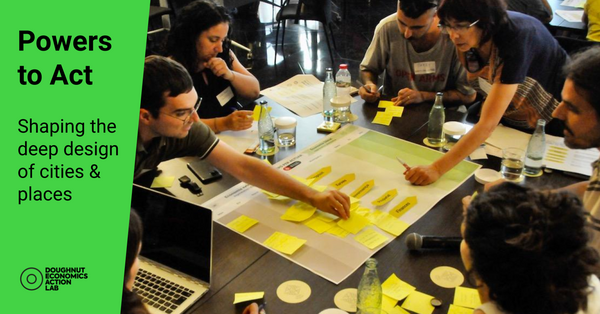Version 1.0 (August 2022)
Overview
Every city or place seeking to live within the Doughnut will recognise that local institutions and ways of working inherited from the past can act as barriers to bringing about the transformations needed. This workshop tool invites local governments, and those working with local government, to address these barriers by exploring their ‘powers to act’ across five deep design layers - Purpose, Networks, Governance, Ownership and Finance - and how these design layers can be aligned with the future they seek to bring about.
Open the tool in a separate window here or preview the tool by scrolling through the slides below. All the additional links are at the bottom of this page.
This content is hosted by a third party: Google Drive (docs.google.com). By clicking 'Show content' you confirm that you have read and agree to their Terms of Service.
By clicking below you also consent to the creation of a cookie so we can remember your choice for one month. See our Privacy Notice for our full cookie policy.
Who is it for
This tool is primarily designed for city leaders and all those working within or with local government that want to reflect on how the deep design of their organisation can be aligned with the future they seek to bring about. Participation can also be open to non-local government participants, i.e. residents, civil sector, academia, businesses etc.
How long does it take
The workshop can last anything from 2 hours, to a full day, to a longer process, it can be adapted to your needs. Some example workflows, for 2-hour and 3-hour workshops are offered in the tool.
What is the format
The workshop can be held in-person or online, some key considerations and options are offered for both formats.
What materials do you need
The key canvas that you need is provided in both printable pdfs, as well as in an online Miro version.
Depending on whether the workshop is in-person or online, you will additionally need a workshop space where you can share a presentation and work in groups, as well as basic workshop materials like sticky notes and pens.
What does the facilitator need to know
The facilitator needs to be well familiar with the concepts of Doughnut Economics and the Powers to Act, and be confident enough to present these, or to be prepared with a recording that can be shared instead. Facilitator(s) should also be able to facilitate group and plenary discussions.
Links
Feedback
Healthy living systems rely on good feedback loops and we invite your comments, reflections and suggestion from using this tool to help us iterate and evolve for future versions.
You can do this two ways:
- The first is to leave a comment in the section below called Join the conversation. The benefit of this approach is that everyone can see and benefit from what you share.
- The second way is to contact the DEAL Team directly via the contact form, choosing the category 'Tools and Stories'.
☒ ☒ ☒ ☒


Kate Copeland-Rhodes
Uttoxeter, England, United Kingdom
We are currently exploring how the Doughnut Economics Model could be used to support the Staffordshire & Stoke.